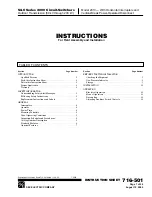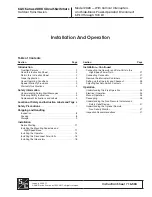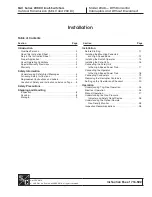
732
Configuring the Spanning Tree Protocol
The VLAN 1 STP instance of SW1 and SW2 are joined with the STP
instance running in SW3. VLANs 2 and 3 consider the path across SW3 as
another segment linking SW1 and SW2, and their SSTP information is
multicast across SW3.
The bridge priority of SW1 and SW2 for VLAN1 instance is 32769 (bridge
pr VLAN identifier).
The bridge priority of SW3 is 32768, per the IEEE 802.w standard.
SW3 is selected as Root Bridge for the VLAN1 instance that is CST, and SW1
is selected as Root Bridge for VLAN2 and VLAN3 (based on the low MAC
address of SW1).
Interoperability with MSTP
RSTP-PV runs an individual RSTP instance for each VLAN. MSTP maps
VLANs to MSTIs, so one-to-one mapping between VLAN and STP instance
is not possible.
MSTP runs multiple MSTIs inside a region and maps them to the CIST on
the border ports. The interoperability model must ensure that internal MSTIs
are aware of changes to any of the RSTP-PV trees. Therefore, the simplest way
to ensure the correct behavior is to join ALL RSTP-PV trees to the CST.
Connecting RSTP-PV trees to the CST ensures that changes in any of the
RSTP-PV STP instances will affect the CST and all MSTIs. This approach
ensures that no changes go unnoticed and no black holes occur in a single
VLAN. As with IEEE STP, every tree in the RSTP-PV domain views the
MSTP regions as virtual bridges with multiple boundary ports. A topology
change in any of RSTP-PV trees will affect the CST and propogate through
every MSTI instance in all MSTP regions. This behavior, consequently, makes
the MSTP topology less stable.
The MSTP implementation simulates RSTP-PV by replicating CIST BPDUs
on the link facing the RSTP-PV domain and sending those BPDUs on ALL
VLANs active on the trunk. The MSTP switch processes IEEE STP VLAN 1
BPDUs received from the RSTP-PV domain using the CIST instance. The
RSTP-PV+ domain interprets the MSTP domain as an RSTP-PV bridge with
all per-VLAN instances claiming the CIST Root as the root of their individual
spanning tree. For the common STP Root elected between MSTP and RSTP-
PV, two options are possible:
Summary of Contents for N2000 Series
Page 50: ...50 Contents ...
Page 54: ...54 Introduction ...
Page 134: ...134 Using Dell OpenManage Switch Administrator ...
Page 168: ...168 Setting Basic Network Information ...
Page 206: ...206 Managing a Switch Stack ...
Page 242: ...242 Configuring Authentication Authorization and Accounting ...
Page 318: ...318 Managing General System Settings Figure 12 24 Verify MOTD ...
Page 322: ...322 Managing General System Settings ...
Page 358: ...358 Configuring SNMP ...
Page 388: ...388 Managing Images and Files ...
Page 415: ...Monitoring Switch Traffic 415 Figure 16 2 sFlow Agent Summary ...
Page 451: ...Monitoring Switch Traffic 451 5 On the Capture Options dialog click Manage Interfaces ...
Page 458: ...458 Monitoring Switch Traffic ...
Page 488: ...488 Configuring Port Characteristics Figure 18 3 Copy Port Settings 8 Click Apply ...
Page 502: ...502 Configuring Port Characteristics ...
Page 567: ...Configuring Port and System Security 567 Figure 19 38 Captive Portal Client Status ...
Page 674: ...674 Configuring VLANs Figure 21 17 GVRP Port Parameters Table ...
Page 680: ...680 Configuring VLANs Figure 21 24 Double VLAN Port Parameter Table ...
Page 714: ...714 Configuring VLANs ...
Page 737: ...Configuring the Spanning Tree Protocol 737 Figure 22 9 Spanning Tree Global Settings ...
Page 760: ...760 Configuring the Spanning Tree Protocol ...
Page 786: ...786 Discovering Network Devices ...
Page 793: ...Configuring Port Based Traffic Control 793 Figure 24 3 Storm Control 5 Click Apply ...
Page 878: ...878 Configuring Connectivity Fault Management ...
Page 899: ...Snooping and Inspecting Traffic 899 Figure 27 17 DAI Interface Configuration Summary ...
Page 903: ...Snooping and Inspecting Traffic 903 Figure 27 24 Dynamic ARP Inspection Statistics ...
Page 924: ...924 Configuring Link Aggregation Figure 28 7 LAG Hash Summary ...
Page 982: ...982 Configuring Link Aggregation ...
Page 1062: ...1062 Configuring DHCP Server and Relay Settings ...
Page 1096: ...1096 Configuring L2 and L3 Relay Features Figure 34 3 DHCP Relay Interface Summary ...
Page 1200: ...1200 Configuring OSPF and OSPFv3 ...
Page 1216: ...1216 Configuring RIP ...
Page 1240: ...1240 Configuring VRRP ...
Page 1291: ...Configuring Differentiated Services 1291 Figure 40 5 DiffServ Class Criteria ...
Page 1336: ...1336 Configuring Auto VoIP ...
Page 1367: ...Managing IPv4 and IPv6 Multicast 1367 Figure 43 20 IGMP Cache Information ...
Page 1422: ...1422 Managing IPv4 and IPv6 Multicast ...
Page 1440: ...1440 System Process Definitions ...
Page 1460: ...Index 1460 ...
















































